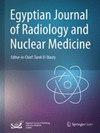Rare presentation of recurrent ovarian carcinoma with secondary Budd–Chiari syndrome: a case report
IF 0.5
Q4 RADIOLOGY, NUCLEAR MEDICINE & MEDICAL IMAGING
Egyptian Journal of Radiology and Nuclear Medicine
Pub Date : 2024-07-01
DOI:10.1186/s43055-024-01305-z
引用次数: 0
Abstract
Budd–Chiari syndrome (BCS) is a rare condition, usually associated with hematological disorders such as thrombotic diathesis and hypercoagulability. Serum CA-125 level is an established tumor marker of ovarian malignancy; however, cases of primary BCS may also show raised CA-125 levels. BCS in a case of ovarian carcinoma is usually primary in nature due to hypercoagulable state, and raised CA-125 levels with tender hepatomegaly in a treated case of ovarian carcinoma usually imply metastatic recurrence in the liver. However, our case demonstrates an atypical secondary cause of BCS in such a patient caused by extrinsic compression of IVC due to recurrent disease. We report an unusual case of a 69-year-old female who presented with nausea and abdominal pain. She had a 7-year-old history of endometrioid carcinoma of the right ovary for which she underwent total abdominal hysterectomy, bilateral salpingo-oophorectomy, omentectomy and pelvic lymph node dissection along with adjuvant chemotherapy. Currently, she had right hypochondrium tenderness, deranged liver function tests (LFT) and raised CA-125 levels, which raised suspicion of hepatic metastasis. However, CECT abdomen revealed peripheral mottled enhancement of liver with multifocal extrahepatic tumor deposits, one of them causing compression of inferior vena cava (IVC) implying a diagnosis of secondary Budd–Chiari syndrome. In a background of treated ovarian malignancy with raised CA-125 levels and deranged LFT, primary suspicion is of hepatic tumor recurrence. However, in our case, radiological investigation revealed diagnosis of secondary Budd–Chiari syndrome due to perihepatic metastatic recurrence with the absence of frank intrahepatic lesions.罕见的复发性卵巢癌伴继发性巴德-恰里综合征:病例报告
巴德-恰里综合征(BCS)是一种罕见病,通常伴有血栓形成和高凝状态等血液病。血清 CA-125 水平是卵巢恶性肿瘤的既定肿瘤标志物;然而,原发性 BCS 病例也可能显示 CA-125 水平升高。卵巢癌病例中的 BCS 通常是由高凝状态引起的原发性 BCS,而在卵巢癌治疗病例中,CA-125 水平升高并伴有触痛性肝肿大通常意味着肝脏转移复发。然而,我们的病例表明,在这样的患者中,非典型继发性 BCS 的病因是复发性疾病对 IVC 的外在压迫。我们报告了一例不寻常的病例,患者是一名69岁的女性,出现恶心和腹痛。她有 7 年的右卵巢子宫内膜样癌病史,为此她接受了全腹子宫切除术、双侧输卵管切除术、卵巢切除术和盆腔淋巴结清扫术,并接受了辅助化疗。目前,她有右下腹压痛、肝功能检查(LFT)异常和CA-125水平升高,这引起了她对肝转移的怀疑。然而,腹部CECT显示肝脏周围斑块状强化,伴有多灶性肝外肿瘤沉积,其中一个肿瘤压迫下腔静脉(IVC),这意味着继发性巴德-卡里综合征的诊断。在卵巢恶性肿瘤治疗后,CA-125 水平升高,LFT 异常的背景下,主要怀疑肝肿瘤复发。然而,在我们的病例中,放射学检查显示诊断为继发性巴德-卡里综合征,原因是肝周转移性复发,且没有明显的肝内病变。
本文章由计算机程序翻译,如有差异,请以英文原文为准。
求助全文
约1分钟内获得全文
求助全文
来源期刊

Egyptian Journal of Radiology and Nuclear Medicine
Medicine-Radiology, Nuclear Medicine and Imaging
CiteScore
1.70
自引率
10.00%
发文量
233
审稿时长
27 weeks
 求助内容:
求助内容: 应助结果提醒方式:
应助结果提醒方式:


